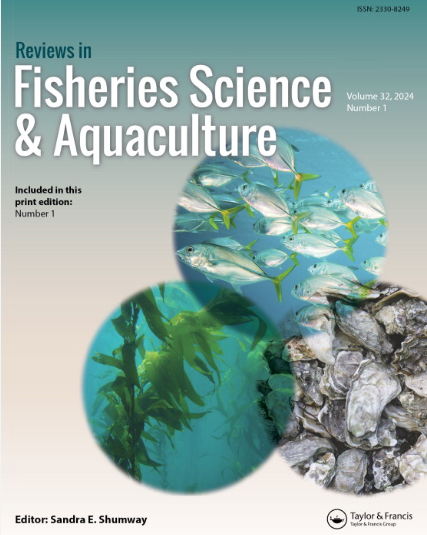海螺后幼虫生物学与招募、连通性和渔业管理的关系
IF 5.3
1区 农林科学
Q1 FISHERIES
引用次数: 0
摘要
皇后螺(Aliger gigas)是加勒比地区重要的渔业资源物种,过度捕捞的威胁日益严重。该物种的生活史以密度依赖性繁殖、底栖卵群和2-4周的浮游营养期为特征,具有长距离传播的潜力。本文综述了幼虫的生长、发育和定居,特别是与环境变量的关系,以及与运输相关的幼虫持续时间和行为。在整个地区收集到的3000多只浮游生物表明,在最温暖的季节,大多数浮鳃虫出现在上层水柱上,有证据表明,晚期浮鳃虫的丰度与随后幼体的丰度之间存在正相关关系。生物物理模型基于迁移持续时间和垂直移动的最佳信息,可以预测种群连通性,并可用于海洋保护区网络的设计。虽然最早的遗传研究表明加勒比地区是一个开放的泛型种群,但最近的分子遗传结果表明,种群表现出类似连续体的结构,并且在某些地方发生了自我招募。从招聘潜力、气候变化和可持续渔业管理等方面讨论了螺后的早期生活史和连通性的现状。本文章由计算机程序翻译,如有差异,请以英文原文为准。
Relationships between Queen Conch Larval Biology and Recruitment, Connectivity, and Fishery Management
Abstract The queen conch (Aliger gigas) is an important fishery resource species in the Caribbean region, increasingly threatened by overharvest. The species’ life history is characterized by density-dependent reproduction, benthic egg masses, and a 2-4-week planktotrophic period with potential for long-distance dispersal. This review focuses on veliger growth, development, and settlement, especially as related to environmental variables, and larval duration and behavior relevant to transport. More than 3000 plankton collections for queen conch made throughout the region show that most veligers occur in the upper water column during the warmest season, with evidence for a positive association between abundance of late-stage veligers and subsequent abundance of juveniles in nursery grounds. Biophysical models based upon the best information on veliger duration and vertical movement yield predictions on population connectivity and can be used in design for networks of marine protected areas. While the earliest genetic studies suggested an open panmictic Caribbean population, more recent molecular genetic results show that populations exhibit a continuum-like structure, and self-recruitment occurs in certain localities. The current state of knowledge of early life history and connectivity for queen conch is discussed in terms of recruitment potential, climate change, and management for sustainable fisheries.
求助全文
通过发布文献求助,成功后即可免费获取论文全文。
去求助
来源期刊

Reviews in Fisheries Science & Aquaculture
FISHERIES-
CiteScore
25.20
自引率
0.90%
发文量
19
期刊介绍:
Reviews in Fisheries Science & Aquaculture provides an important forum for the publication of up-to-date reviews covering a broad range of subject areas including management, aquaculture, taxonomy, behavior, stock identification, genetics, nutrition, and physiology. Issues concerning finfish and aquatic invertebrates prized for their economic or recreational importance, their value as indicators of environmental health, or their natural beauty are addressed. An important resource that keeps you apprised of the latest changes in the field, each issue of Reviews in Fisheries Science & Aquaculture presents useful information to fisheries and aquaculture scientists in academia, state and federal natural resources agencies, and the private sector.
 求助内容:
求助内容: 应助结果提醒方式:
应助结果提醒方式:


